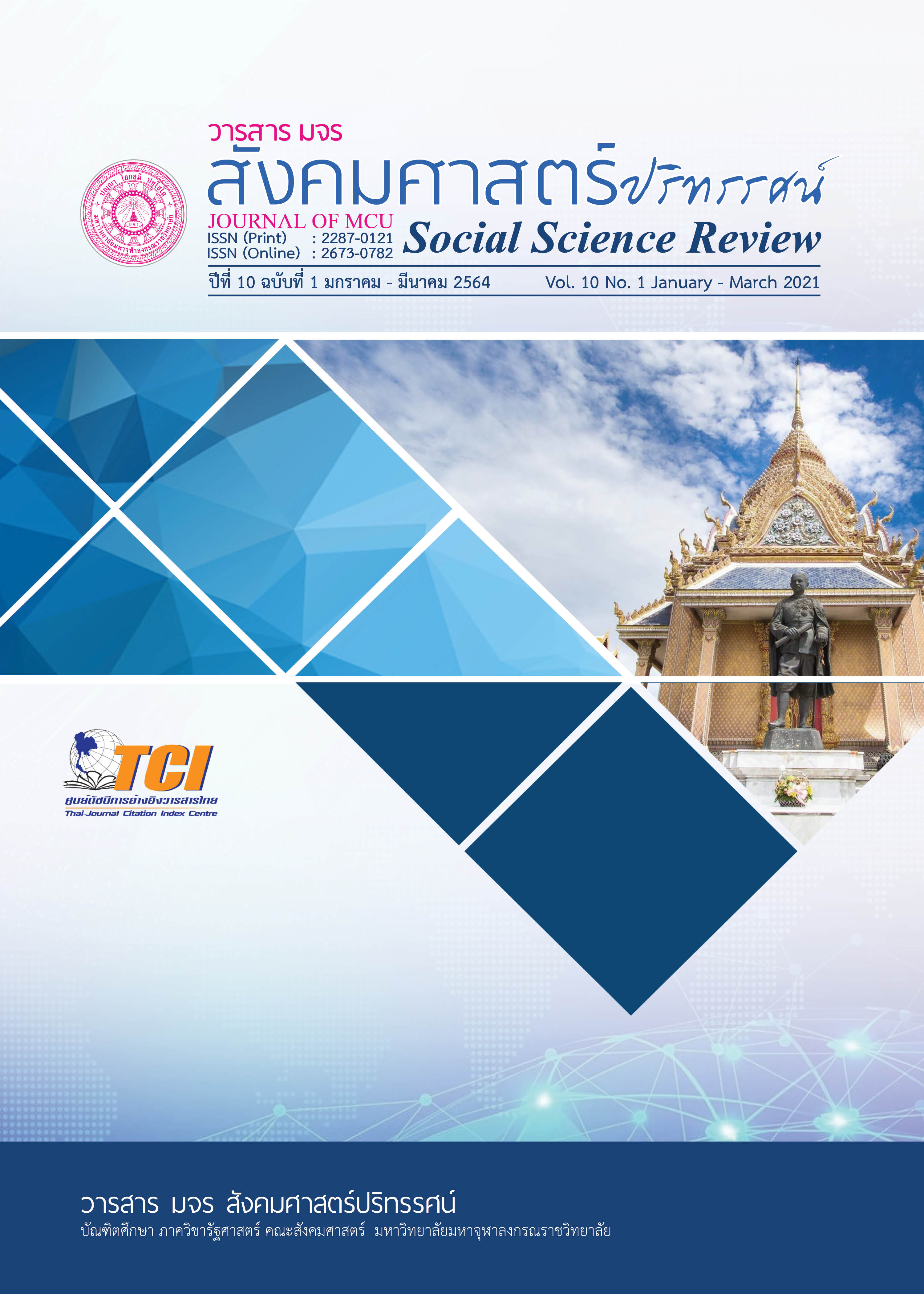รูปแบบการเผยแผ่พระพุทธศาสนาของพระสงฆ์ในสังคมพหุวัฒนธรรม ในเขตหนองจอก กรุงเทพมหานคร
คำสำคัญ:
รูปแบบเผยแผ่พระพุทธศาสนา, สังคมพหุวัฒนธรรม, พระสงฆ์บทคัดย่อ
บทความวิจัยนี้มีวัตถุประสงค์เพื่อศึกษารูปแบบการเผยแผ่พระพุทธศาสนาของพระสงฆ์ในสังคมพหุวัฒนธรรมเขตหนองจอก กรุงเทพมหานคร ใช้การวิจัยแบบผสานวิธี ระหว่างการวิจัยเชิงคุณภาพด้วยการวิจัยเชิงเอกสาร สัมภาษณ์เชิงลึก กับผู้ให้ข้อมูลสำคัญ จำนวน 20 รูปหรือคน และการวิจัยเชิงเชิงปริมาณ ด้วยการแจกแบบสอบถามจำนวน 242 รูปหรือคน สถิติที่ใช้วิเคราะห์ข้อมูล ได้แก่ ความถี่ร้อยละ ค่าเฉลี่ยและส่วนเบี่ยงเบนมาตรฐาน ผลการวิจัยพบว่า 1. พระสงฆ์มีวิสัยทัศน์ในการนำหลักธรรมและวิธีการมาใช้พัฒนาการเผยแผ่ แต่การเผยแผ่ผ่านสื่อออนไลน์มีไม่มากและช่องทางไม่หลากหลาย 2. องค์ประกอบการเผยแผ่ ประกอบด้วย 2.1 ทฤษฎีการสื่อสาร SMCR คือ ผู้ส่งสาร สาร ช่องทาง ผู้รับ 2.2 หลักพุทธวิธี 4 ส. คือ สันทัสสนาแจ่มแจ้ง สมาทปนาจูงใจ สมุตเตชนาแกล้วกล้า และสัมปหังสนาร่าเริง 2.3 ข้อควรระวังการเผยแผ่พระพุทธศาสนาในสังคมพหุวัฒนธรรมต้องตระหนักถึงความแตกต่างทางความเชื่อ การเผยแผ่ควรเลือกหลักธรรมที่เป็นกลาง และคณะสงฆ์ควรส่งเสริมโดยใช้ทฤษฎีการบริการงานคุณภาพ PDCA ให้มากขึ้น 3. รูปแบบการเผยแผ่พระพุทธศาสนา การเผยแผ่พระพุทธศาสนาใช้วิธีการเทศน์ ปาฐกถา สวดมนต์และกิจกรรมในโอกาสต่าง ๆ เช่น งานบุญ งานบวช การสอนศีลธรรมในโรงเรียน และรักษาศีล 5
เอกสารอ้างอิง
กรมการศาสนา. (2540). คู่มือพระสังฆาธิการว่าด้วยเรื่องการคณะสงฆ์และการพระศาสนา.กรุงเทพฯ: กรมการศาสนา.
จำเนียนน้อย สิงหะรักษ์. (2555). ศึกษาหลักสามัคคีธรรมในพระพุทธศาสนาเถรวาท. (รายงานผลการวิจัย). กำแพงเพชร : มหาวิทยาลัยราชภัฏกำแพงเพชร.
ทัศนีย์ เจนวิถีสุข. (2554). การสื่อสารเชิงพุทธกับการเปลี่ยนแปลงสังคม (ดุษฎีนิพนธ์ปริญญาพุทธศาสตรดุษฎีบัณฑิต สาขาวิชาพระพุทธศาสนา). พระนครศรีอยุธยา: มหาวิทยาลัยมหาจุฬาลงกรณราชวิทยาลัย.
พรรณธิภา เอี่ยมศิริปรีดา และคณะ. (2553). ศาสนากับการสร้างสันติสุข: บทบาทของพระสงฆ์ในการส่งเสริมสันติสุขในชุมชนเขตกรุงเทพมหานคร (รายงานผลการวิจัย). กรุงเทพฯ: มหาวิทยาลัยมหิดล.
พระครูนิวิฐศีลขันธ์ (ณรงค์ ตวฑฺฒโน). (2557). รูปแบบการพัฒนาทุนมนุษย์ตามหลักพุทธธรรมในองค์กร ปกครองส่วนท้องถิ่น (ดุษฎีนิพนธ์ปริญญาพุทธศาสตรดุษฎีบัณฑิต สาขาวิชาการจัดการเชิงพุทธ) พระนครศรีอยุธยา : มหาวิทยาลัยมหาจุฬาลงกรณราชวิทยาลัย.
พระพรหมคุณาภรณ์ (ป.อ.ปยุตฺโต).(2555). ความสำคัญของพระพุทธศาสนา. กรุงเทพฯ: โรงพิมพ์สหธรรมิก.
พระมหานภดล ปุญฺญสุวฑฺฒโก. (2560). การอยู่ร่วมกันของคนในสังคมพหุวัฒนธรรม: กรณีศึกษาชุมชนเขตบางรัก กรุงเทพมหานคร. (รายงานผลการวิจัย). พระนครศรีอยุธยา: มหาวิทยาลัยมหาจุฬาลงกรณราชวิทยาลัย.
พระมหารุ่งเพชร ชวนปญฺโญ. (2548). รูปแบบวิธีการเผยแผ่พุทธธรรมของพระธรรมกิตติวงค์ (ทองดี สุรเตโช). (รายงานผลการวิจัย). พระนครศรีอยุธยา : มหาวิทยาลัยมหาจุฬาลงกรณราชวิทยาลัย.
ภัสวลี นิติเกษตรสุนทร. (2542). การสื่อสาร หน่วยที่ 2 กระบวนการและบริบทในการสื่อสาร สาขาวิชาศิลปศาสตร์ มสธ. (พิมพ์ครั้งที่ 7). กรุงเทพฯ: สำนักพิมพ์มหาวิทยาลัยสุโขทัย ธรรมาธิราช.
อนวัช ยาวิชัย และสุนัดตา สัตตวัตรกุล. (2556). การพัฒนาบุคลากรเพื่อรองรับการจัดการศึกษาของมหาวิทยาลัยแม่โจ้ เพื่อมุ่งสู่ประชาคมอาเซียน (รายงานผลการวิจัย). เชียงใหม่: มหาวิทยาลัยแม่โจ้.
ดาวน์โหลด
เผยแพร่แล้ว
รูปแบบการอ้างอิง
ฉบับ
ประเภทบทความ
สัญญาอนุญาต
ลิขสิทธิ์ (c) 2021 วารสาร มจร สังคมศาสตร์ปริทรรศน์

อนุญาตภายใต้เงื่อนไข Creative Commons Attribution-NonCommercial-NoDerivatives 4.0 International License.
เพื่อให้เป็นไปตามกฎหมายลิขสิทธิ์ ผู้นิพนธ์ทุกท่านต้องลงลายมือชื่อในแบบฟอร์มใบมอบลิขสิทธิ์บทความให้แก่วารสารฯ พร้อมกับบทความต้นฉบับที่ได้แก้ไขครั้งสุดท้าย นอกจากนี้ ผู้นิพนธ์ทุกท่านต้องยืนยันว่าบทความต้นฉบับที่ส่งมาตีพิมพ์นั้น ได้ส่งมาตีพิมพ์เฉพาะในวารสาร มจร สังคมศาสตร์ปริทรรศน์ เพียงแห่งเดียวเท่านั้น หากมีการใช้ภาพหรือตารางหรือเนื้อหาอื่นๆ ของผู้นิพนธ์อื่นที่ปรากฏในสิ่งตีพิมพ์อื่นมาแล้ว ผู้นิพนธ์ต้องขออนุญาตเจ้าของลิขสิทธิ์ก่อน พร้อมทั้งแสดงหนังสือที่ได้รับการยินยอมต่อบรรณาธิการ ก่อนที่บทความจะได้รับการตีพิมพ์ หากไม่เป็นไปตามข้อกำหนดเบื้องต้น ทางวารสารจะถอดบทความของท่านออกโดยไม่มีข้อยกเว้นใดๆ ทั้งสิ้น





